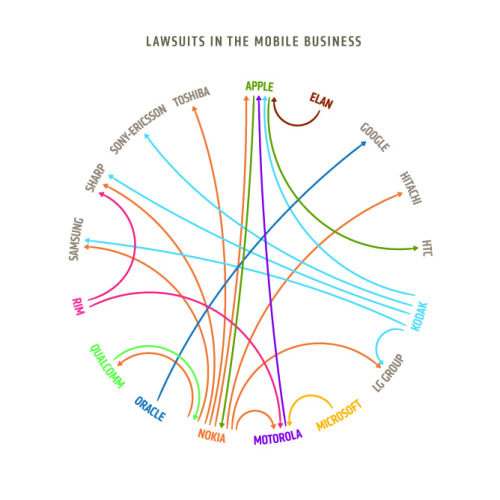 The recent flurry of lawsuits regarding patent infringements has caused a stir in the tech community. This year alone we?ve seen Oracle v. Google, HTC v. Apple, Samsung v. Apple, Lodsys v. App developers (& now perhaps Apple), and so on. As an example of how out of hand the situation has become, just look at the mobile phone business (see picture). And, it?s not just the large corporations suing each other. Non-practicing entities (NPEs), also known as patent trolls, are firms that license patents without producing goods. Lawsuits from such entities have been associated with ?half a trillion dollars of lost wealth to defendants from 1990 through 2010, mostly from technology companies?. It doesn?t seem as though the wealth has been transferred to the little guys either, as we might hope.
The recent flurry of lawsuits regarding patent infringements has caused a stir in the tech community. This year alone we?ve seen Oracle v. Google, HTC v. Apple, Samsung v. Apple, Lodsys v. App developers (& now perhaps Apple), and so on. As an example of how out of hand the situation has become, just look at the mobile phone business (see picture). And, it?s not just the large corporations suing each other. Non-practicing entities (NPEs), also known as patent trolls, are firms that license patents without producing goods. Lawsuits from such entities have been associated with ?half a trillion dollars of lost wealth to defendants from 1990 through 2010, mostly from technology companies?. It doesn?t seem as though the wealth has been transferred to the little guys either, as we might hope.
Moreover, as a result of the seemingly endless slew of lawsuits, corporations are beginning to stock up on patents in order to better defend themselves in court (e.g. Google?s acquisition of Motorola Mobility).Not only have the acquisition costs of such patents skyrocketed, but one should question whether incumbents are using their portfolios to file legitimate claims or simply to protect their market position by stalling competitors? activities (amid an incumbent?s own failure to innovate).
As you can see, corporations are wasting significant time and resources in litigation that could be better spent on research and development. Yet what choice do they have? Given the current state of patent law, they may not have any other options.Many critics argue the benefits of our current system have now been far outweighed by the costs; yet simply abolishing the patent system is not the answer. Society benefits from the patent system. In exchange for protection over a limited time period, the inventor must fully disclose the details of the patented product along with the best mode of producing it ? even before the patent expires. Once the patent expires, everyone has the ability to recreate the product, and in the meantime, people can use the information provided in the filing as inspiration for further innovation. Because of the value provided to society as a whole, I believe our only option is to change the current law.
I am far from an expert on patent law, so I do not profess to have a clear answer. We should begin by acknowledging that there is no such thing as a software patent. The lines around what can and cannot be patented are fuzzy, and the laws have fallen far behind technology today (e.g. Patents are intended for physical products, and math cannot be patented. Unfortunately, software is composed of algorithms, which are basically math and often do not have a physical product associated with them). Sure, legal decisions over the years have attempted to update and clarify patent regulation, but it remains wholly inadequate and unclear as it relates to software. This isn?t surprising given how slow moving the legal system is in general, particularly when compared to the fast moving technology world. So actually creating patent regulation specifically for software should be step one.
Once we know what warrants a software patent, we can then focus on making other changes to the system that may reduce the frequency of frivolous lawsuits and/or level the playing field. For instance,
- The length of a patent could be shorter, lessening its value.
- We could amend the filing process as a whole, either by shortening it altogether or by allowing for a shorter, temporary filing that is easier and less expensive (thus making it easier for smaller players to file).
Again, I do not know the answer, and these suggestions are just a start. Either way, we can certainly acknowledge the problem is multi-layered and complex. From rent-seeking NPE patent trolls to panicky industry incumbents that have fallen behind, the improper application of traditional patent law to various facets of the tech sector has created a sideshow that threatens to curb innovation and stall progress. But, regardless of how long it will take to implement policy change, great near-term emphasis will continue to be placed on fuzzy portfolios of intellectual capital.
Source: http://www.onlineeconomy.org/the-patent-wars-litigate-or-innovate
arrested development baltimore ravens chris christie ny jets ny jets shannon tweed shannon tweed
No comments:
Post a Comment